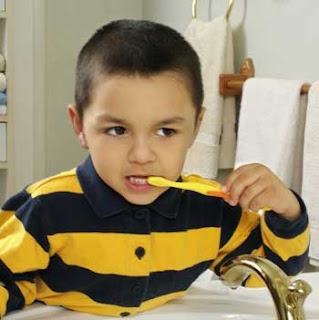Lucas loves to eat candy, especially anything with caramel. He likes to eat a Twix or Milky Way from the school vending machine almost every day. He has noticed recently that his teeth have been hurting more and more when he bites into food, but he doesn’t know why and keeps forgetting to talk to his mom about it because she is always busy. One day, he and his friends go to Rusty’s to eat pizza. He bites into his first slice and yelps in pain and grabs his jaw. His friend says to him, “You should go to the dentist. When was the last time you went?” Lucas can’t remember when the last time he went to the dentist was. He tells his friend, “I think it was like over 6 years ago when I was 7. I don’t know why my teeth hurt so much. I brush my teeth like every few days.”
Questions for Discussion:
1. Why do you think Lucas’s teeth hurt?
2. What can he do to take better care of his teeth?
3. How do you take care of your teeth? How often do you think you should brush, floss, and/or use mouth wash to have a healthy mouth? And how often do you actually do it?
4. How did you learn to take care of your teeth and mouth? Who taught you?
5. Why is brushing your teeth important? What might happen if you don’t?
6. Who can Lucas see to get more information about dental health? Who would you go to?
Factoids:
**The toothbrush was invented more than 500 years ago by the Chinese. Dentists recommend you change your toothbrush every 3 months. Visit your dentist for a checkup and you’ll usually get a free one.
**People who drink 3 or more sugary sodas daily have 62% more dental decay, fillings and tooth loss.
**What is a cavity? Cavity develops when a tooth decays, or breaks down. A cavity is a hole that can grow bigger and deeper over time. Cavities are also called dental caries, and if you have a cavity, it's important to get it repaired.
**To prevent cavities, you need to remove plaque, the transparent layer of bacteria that coats the teeth. The best way to do this is by brushing your teeth twice a day and flossing at least once a day. Brushing also stimulates the gums, which helps to keep them healthy and prevent gum disease.
**Tips on Proper Brushing
- Hold your brush at a 45-degree angle against your gum line. Gently brush from where the tooth and gum meet to the chewing surface in short (about half-a-tooth-wide) strokes. Brushing too hard can cause receding gums, tooth sensitivity, and, over time, loose teeth.
- Use the same method to brush all outside and inside surfaces of your teeth.
- To clean the chewing surfaces of your teeth, use short sweeping strokes, tipping the bristles into the pits and crevices.
- To clean the inside surfaces of your top and bottom front teeth and gums, hold the brush almost vertical. With back and forth motions, bring the front part of the brush over the teeth and gums.
- Using a forward-sweeping motion, gently brush your tongue and the roof of your mouth to remove the decay-causing bacteria that exist in these places.
- Use an egg timer or play a favorite song while brushing your teeth to get used to brushing for a full 2 to 3 minutes. Some electronic toothbrushes have timers that let you know when 2 minutes are up.
**Tooth decay is the single most common chronic childhood disease.
**More than 51 million hours of school are lost each year by children due to dental related illness.
**Early tooth loss caused by dental decay can results in failure to thrive, impaired speech development, absence and inability to concentrate in school, and reduced self-esteem.
**The main reason for going to the dentist regularly — every 6 months — is prevention.
The goal is to prevent tooth decay, gum disease, and other disorders that put the health of your teeth and mouth at risk.
**Considering more than 200,000 injuries to the mouth and jaw occur each year, dentists support the use of mouthguards in a variety of sports activities. Mouthguards are effective in moving soft tissue in the oral cavity away from the teeth, preventing laceration and bruising of the lips and cheeks, especially for children who wear braces.
The goal is to prevent tooth decay, gum disease, and other disorders that put the health of your teeth and mouth at risk.
**Considering more than 200,000 injuries to the mouth and jaw occur each year, dentists support the use of mouthguards in a variety of sports activities. Mouthguards are effective in moving soft tissue in the oral cavity away from the teeth, preventing laceration and bruising of the lips and cheeks, especially for children who wear braces.
How Mentors Can Help:
**Encourage you mentee to eat regular nutritious meals and avoid frequent between-meal snacking.
**Have them drink fluoridated water.
**Practice brushing your teeth. Teach your mentee the motions of brushing their own teeth.
**Clean to the beat. Brushing, flossing, and rinsing are all rhythmic activities. Playing music will help your mentee enjoy oral care routines. On average, brushing should last two minutes and rinsing 60 seconds. Together these activities last the length of a typical song.
**Go to http://www.freeprintablebehaviorcharts.com/oralhygienecharts.htm and print a free Teeth Care Chart. It’s a fun way to keep track of number of times your mentee brushes their teeth.
**Praise your mentee for their awesome brushing.
Additional Resources:





1 comment:
For me dental hygiene is a must to have a healthy lifestyle. My dentist has given me steps and dental tips to include them in my daily routine to have and maintain good oral health.
Post a Comment